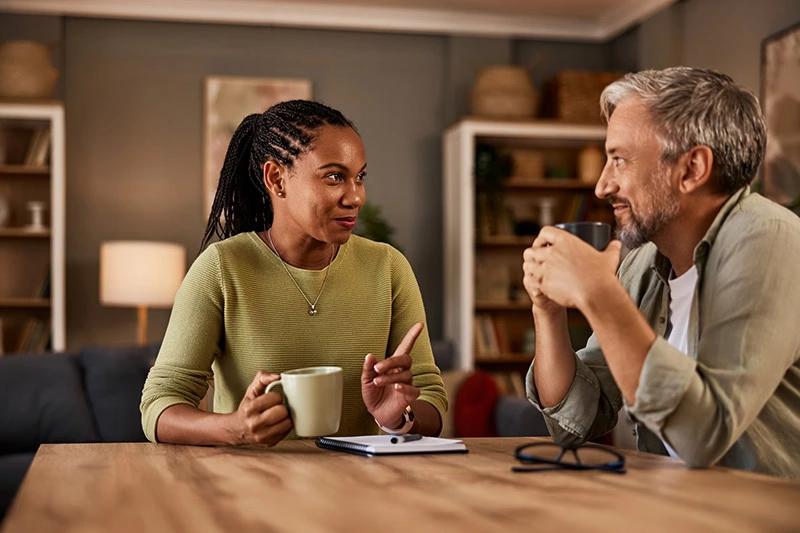The unfortunate reality of those living with addiction is that loneliness and isolation tend to be staples in their lives. People with substance use disorder may feel like they have lost the ability to connect with others, leading them down a path of depression and strained relationships.
But rebuilding relationships is possible with effective communication skills. Communication skills in rebuilding relationships are critical for overall well-being and recovery. How can you effectively communicate with your loved ones and rebuild damaged relationships? Here are some things skills can help.
Most Important Communication Skills in Rebuilding Relationships – Active Listening
Active listening is perhaps the most important communication skill to learn when rebuilding relationships. That’s because oftentimes, people in addiction might forget that their addiction impacts those around them. Whether you have strained family relationships, are looking to repair friendships that addiction has damaged, or want to rebuild a romantic relationship, active listening is the first step.
So, what does it mean to actively listen? It means more than just hearing the words that someone says. Active listening involves truly paying attention to what the other person is saying and understanding their perspective. Effective communication skills in rebuilding relationships and active listening can involve:
- Listening without the intention of providing a rebuttal or response
- Asking clarifying questions to gain a deeper understanding
- Reflecting back on what the person has said to show that you have been actively listening
- Showing compassion and validating emotions
By actively listening, you are showing the other person that their feelings and thoughts are important to you. This can help build trust and open up lines of communication.
It’s also important to note that active listening is not just for the benefit of the other person or our relationships. Research shows that the active listener can experience benefits such as reduced defensiveness and increased motivation to change.
Conflict Resolution
Conflict resolution, in the simplest terms, means finding a solution or resolution to a disagreement between two or more parties. These conflicts can arise in any type of relationship, whether it be with friends, family, coworkers, or romantic partners.
Effective conflict resolution in addiction can often be a point of contention. Research shows that individuals who struggle with problem resolution skills often exhibit negative behaviors, including substance use, fighting, alcohol use, and low academic achievement. Of course, poor conflict resolution also leads to strained relationships.
Fortunately, learning to resolve conflicts and foster more healthy relationships is possible. You can do so through:
- Engaging in family therapy, which often focuses on improving communication, developing problem-solving skills, and building trust
- Participating in therapies or courses that also help you regulate emotions and avoid conflict, such as Dialectical behavioral therapy (DBT)
- Practicing mindfulness and self-awareness, which can help you better understand your own emotions and reactions in conflicts
- Developing empathy towards others and learning to see things from their perspective
Combining these skills with effective communication skills in rebuilding relationships can lead to improved conflict resolution and overall healthier relationships.
Using Assertive Instead of Defensive Skills
Effective communication skills in rebuilding relationships also involve learning how to prioritize and use assertive communication instead of defensive or aggressive communication. Assertive communication involves expressing yourself in a clear, direct, and respectful manner, while also respecting the rights and boundaries of others. This can help prevent misunderstandings and conflicts from escalating.
On the other hand, defensive or aggressive communication often involves attacking or blaming others, which can further damage relationships and hinder conflict resolution. Being able to express your needs and feelings assertively can lead to more productive conversations where both parties feel heard and respected.
While it can be difficult to distinguish between the two, especially during times of high stress, it’s important to try and practice assertive communication when possible. Learning to do so can help you build confidence, self-esteem, and find balance in healthy relationships.
Gain the Skills You Need for Recovery Today
At Roaring Brooks Rehab in Lexington, KY, we know that it can be difficult to navigate communication in relationships, especially during recovery. That’s why we offer therapy sessions and addiction treatment to help individuals develop the skills needed for recovery. We provide effective therapies, from DBT to trauma therapy, group therapy, and others that can help you better understand yourself and recover from addiction. Don’t wait to seek help – call us and start gaining the skills you need for addiction recovery today.


